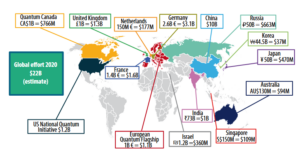A journey through the funding, the hype, the opportunities, and the risks related to the emerging field of quantum technologies
First published: 06 November 2020
The global quantum ecosystem
Major global economies are undertaking huge initiatives to promote and accelerate quantum technology research and development. Since the inception of its National Quantum Technologies Program in 2013, the UK has invested almost£ 1 B to foster the quantum technology market. The European Commission allocated one billion euros of funding over ten years to launch the European Quan-tum Flagship in 2018. The same year, the United States House of Representatives passed The National Quantum Initiative Act. Numerous countries have followed in the last few years, and now almost all continents have countries with national quantum initiatives at different levels of commitment and investment.
In terms of public funding, we have estimated it reaches around $ 22 B worldwide (see Fig. 1 [2]). It is not a quantum race; it is a quantum ecosystem, full of collaborations and partnerships. Globally, a growing number of start-ups and big tech companies are involved in building quantum computers using different physical architectures, including trapped ions or superconducting circuits. We still do not know how much longer it will take to build a fault-tolerant quantum computer with a clear quantum advantage over classical systems, and able to solve problems out of reach of current technology. In the meantime, we have Noisy Intermediate-ScaleQuantum (NISQ) computers already available in different forms, as well as numerous quantum computing cloud services where businesses and researchers can start using quantum computing algorithms and study whether there is an advantage of applying them to solve specific problems. Quantum computing algorithms can be applied in several sectors, such as material science, healthcare, and financial markets.
At some point, quantum computing will be a practical reality in different fields for fast, accurate and secure data processing and problem-solving, while other quantum technologies such as secure quantum key distribution (QKD) and quantum sensing are already emerging as established technologies. The quantum communications market will grow exponentially in the coming years. There are several initiatives creating QKD links between cities or countries as well as various projects focused on understanding how we could implement QKD services (ground based or using satellites) to protect data and deliver ultrasecure encryption keys.
There are already commercially available products based on quantum sensing, providing specific solutions for various sectors such as in healthcare (e.g.medical imaging) or the construction sector. Overall, we are currently in the early development of quantum technologies. A new market is being created based on a financial boost for more fundamental and basic research science. However, not everything regarding quantum technologies is still in the research phase, and not everything is ready to be commercialised. This situation makes quantum technologies a fascinating field, where research institutions and academics work side-by-side with businesses.

Fig. 2 Global distribution of companies working in quantum technologies per country.
Risks and opportunities
In the quantum technologies ecosystem, there is a clear gap between research and industry, or in other words, between academia and business. There is an increasing number of startups founded by researchers who do not have enough experience or support to build a business. If we think of government or funding agencies requirements, a clear business proposition is required for them so that they can fund the basic science to develop new products that can be commercialized. And the same applies to a more general audience who read the news and check the media, sometimes believing some unfounded hype. You could argue this happens with all emerging technologies. What is different with quantum technologies?
Quantum mechanics is a very appealing field that clearly generates excitement and mystical overtones when people hear it mentioned. Quantum physics and maths are perceived to be difficult by most students, and there is perhaps even a wider public perception that only ‘nerds’ can work with physics and maths. It is possible that Richard Feynman was right, and that “nobody really understands quantum mechanics”, making the gap between the different stakeholders in the community even wider. In the quantum ecosystem, we need to work together to shape this new market. As a society, we should think of the potential risks that all emerging technology brings and produce appropriate regulatory guidelines to mitigate these risks [3].
In the field of quantum technologies, a global risk could be the unjust beneficial distribution of the technology. For example, imagine that just one country in the world (or a company) builds a very powerful quantum computer, able to solve problems of huge complexity. Should this computer be used to help society as a whole to treat global problems, such as climate change, resources distribution, or vaccine development, or should this computer be used for whatever the owner, being a nation or a company, wishes to use it for, say for military purposes? How could the use of these new technologies affect geopolitical relations? Who should be the owner of very secure and important data? These are just a few examples of the implications new quantum technologies could have on the planet. However, do not forget we are talking about emerging technologies, and this means these technologies are still in their infancy.
The biggest threat and risk of all is the unknown, the fact that we cannot predict what this technology could ultimately deliver. We have clear examples in the past of how every scientific and technical concepts were key in the development of mass destruction technology. Repeating the same mistakes with quantum technologies must be avoided. It is necessary to generate a wider public enthusiasm to attract the young and bright minds in the quantum ecosystem. Furthermore, business professionals need to be familiar with the emerging quantum technologies in order to utilize their full potential in the technology driven economy. A well-designed quantum ecosystem can only push the technology-based economy forward by providing the necessary skills. Developing workforce skills in emerging quantum technologies is enormously challenging, in all likelihood leading to a skills shortage for the coming decades.

Fig. 3 Distribution of quantum companies per sector. Quantum computing indicates companies working on both hardware and software solutions.
The quantum workforce
Almost all continents already have startups in quantum technologies. It is indeed very interesting to see how the numbers grow every week. In Fig. 2 the global distribution of startups per country is shown. Clearly the United States is the country with the largest number of quantum companies, followed by the United Kingdom and Canada. Additionally, there are several countries with just one or two companies. This is very interesting because it clearly shows that there is a global interest, opportunity, and expertise. The distribution of companies per sector shows that most companies focus on quantum computing, being either hardware or software and applications, or both (see Fig. 3). There is also a big number of companies with a focus on quantum communications and security, and then a smaller number insensing or consulting. The global market size for quantum technologies is expected to grow to more than $ 16 B in the next ten years.
We have estimated what this will mean in terms of job creation. In Fig. 4, the exponential growth of jobs in quantum technologies is shown for the next two decades, with almost 600,000 new jobs in 2040. Quantum stakeholders and companies have already highlighted how difficult it is to find people with the right skills to fit the new positions being generated in the job market. This has been named the‘skills shortage’ or ‘quantum bottleneck’ [4, 5]. More important is the fact that, for this explosion of jobs in the next twenty years, we need to ensure that there will be enough people with the right skills to fill these positions. Currently, the only trained people in quantum are highly academic, i.e. PhD level. There is a need to create a quantum workforce by introducing quantum concepts earlier in primary and secondary schools, and by having more opportunities such as quantum apprenticeships and quantum engineering programs.
The only solution is to change before the change happens, not with the change. There are several initiatives globally, mainly from the perspective of outreach activities, to raise the awareness of quantum technologies within the young population. However, it is also important to teach the teachers to be aware of the importance of this new technology and its future market. It was not until recently that children learned how to program in school. For quantum technologies, there is a need to address the education of the future workforce as soon as possible, as we are aware that this is a lengthy process. At higher education levels, most students already thinking of a career in quantum technologies will probably study physics. However, what we know is that engineering degrees could also provide very good potential candidates for several positions in the market [6, 7]. Furthermore, there are already several master programs around the world with a focus on quantum engineering. The quantum workforce will not only consist of quantum physicists, but also computer scientists, engineers, technicians, and even people with a background in business, marketing, and sales. More than half of the quantum companies are currently recruiting.
At various career events and discussion panels, managers at quantum companies were asked what they find more valuable when hiring. Surprisingly enough, soft skills such as eagerness to learn, good communication skills, and teamwork are as important as any technical skill or degree. Currently, candidates are not fully aware of their skills and how much in demand they are in the quantum market. Companies such as Qureca focus on supporting individuals who seek a career in quantum technologies by providing training and specialized care coaching and placing them as ideal candidates in quantum companies. Companies in quantum technology can be classified as working in quantum sensing, quantum communication and security, quantum computing hardware, quantum algorithms and applications, or in enabling or facilitating technologies. The latter are companies not developing a quantum computer nor a fully commercial quantum product.
These companies are the ones developing key technologies that are part of the global supply chain to be able to commercialise quantum technologies. Companies working in the fields of optics and photonics, as well as specific training schemes to fit their staff as part of the new quantum workforce, are going to be essential elements of the new quantum market. Several societies have been involved in raising awareness, creating reports and organizing events in order to bring companies into the quantum community. The US, as well as Europe, are creating specific organizations for businesses to enable a robust commercial quan-tum-based industry and the associated supply chain.

Fig. 4 Estimation of global number of jobs created for the quantum technologies market in the next two decades.
Summary
There is an existing quantum ecosystem which is growing week by week. Are there hotspots, that is, places where this technology is going to be more fruitful than in others? Well, this will depend on how the products will be developed and commercialized in the coming years. It is true that different technologies have been developed at a different rate in different continents. For example, funded mainly by private investment from huge corporations, quantum computing has been established early in the US. However, we now see more companies trying to build quantum computers in Europe, Asia and Australia. China has been focusing on the development and deployment of quantum communications and is further ahead than the other countries. In Europe there is quantum sensor technology already available on the market. Specific technologies seem to be way ahead in some countries in comparison with others, but this could change dramatically in the next few years. Are the market expectations close to reality or are they unrealistic? I guess we still need to wait to see how the market develops. Nobody could imagine that a pandemic was going to hit the whole world, leaving a lot of uncertainty in our society. Forecasts and research studies can be very close to reality but they are never exact. We are entering into the unknown, and this is another ingredient of why this field is so exciting, and we are working together as a community to build the new quantum future.
DOI: 10.1002/phvs.202000044
[1] Gartner: Hype cycle for artificial intelligence, www.gartner.com/SmarterWithGartner, 2019 [2] A. Venegas-Gomez and R. Manivan-nan: Overview on quantum initiatives worldwide, www.qureca.com/overview-on-quantum-initiatives-worldwide/ [3] The Royal Society: The future of photonics: sensors and quantum technologies, 6, October 2019 [4] The New York Times: The Next Tech TalentShortage: Quantum Computing Researcher’s, October 2018 [5] The Guardian: How can we compete with Google?: the battle to train quantum cod-ers, January 2019 [6] M .F. J. Fox, B. M. Zwickl, H. J. Lewandowski: Preparing for the quantum revolution – what is the role of higher education?, ArXiv:2006.16444, 2020 [7] M. N. Amin: The Needs and Challenges of Workforce Development in Quantum Computing, American Society for Engineering Education, 2019
Original publication: The Quantum Ecosystem and Its Future Workforce – Venegas‐Gomez – 2020 – PhotonicsViews – Wiley Online Library


